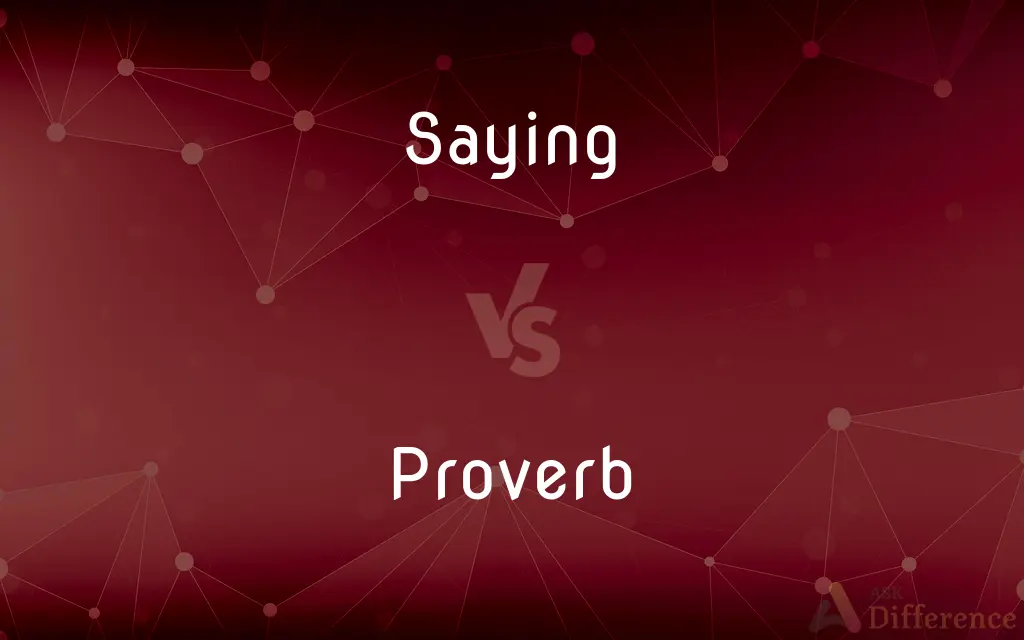Saying vs. Proverb — What's the Difference?
By Tayyaba Rehman — Updated on October 5, 2023
A saying is a commonly spoken phrase, while a proverb is a short, well-known expression that imparts wisdom or advice.

Difference Between Saying and Proverb
Table of Contents
ADVERTISEMENT
Key Differences
A saying is a phrase or sentence that conveys an observation or sentiment. Conversely, a proverb typically encapsulates a cultural truth or piece of advice rooted in common wisdom.
Sayings can arise from popular culture, personal experiences, or even colloquialisms. On the other hand, proverbs often stem from ancient wisdom and have been passed down through generations.
Not all sayings offer advice; some merely express an emotion or state a fact. In contrast, proverbs often provide insight or guidance on how to approach specific situations or life in general.
While sayings might be relevant for a certain period or culture, proverbs usually possess a timeless quality, remaining pertinent across various cultures and eras.
The versatility of sayings allows them to be incorporated into daily language effortlessly. Proverbs, given their instructive nature, are invoked more sparingly, often to emphasize a lesson or moral.
ADVERTISEMENT
Comparison Chart
Definition
Commonly spoken phrase or expression.
Short, well-known statement giving advice.
Origin
Can arise from various sources.
Typically ancient or cultural wisdom.
Purpose
Convey sentiment or observation.
Impart wisdom or advice.
Timelessness
May be specific to an era or culture.
Generally has a timeless quality.
Frequency in Usage
Used more commonly in everyday language.
Used more sparingly to emphasize a lesson.
Compare with Definitions
Saying
A phrase expressing an opinion or sentiment.
Actions speak louder than words is a popular saying.
Proverb
An adage that encapsulates a universal truth.
Honesty is the best policy is a proverb emphasizing truthfulness.
Saying
A brief expression, often colloquial in nature.
Break a leg is a saying used in the theater world.
Proverb
A phrase that embodies cultural or ancestral wisdom.
The early bird catches the worm is a proverb motivating diligence.
Saying
A statement that reflects common beliefs.
Better safe than sorry is a saying many abide by.
Proverb
A short, familiar saying imparting wisdom.
A penny saved is a penny earned is a well-known proverb.
Saying
A phrase often used in specific contexts or situations.
When in Rome, do as the Romans do is a travel-related saying.
Proverb
A traditional saying expressing a common observation.
Every cloud has a silver lining is a proverb about optimism.
Saying
An utterance that may be tied to cultural or contemporary references.
There's no place like home is a saying inspired by popular culture.
Proverb
A proverb (from Latin: proverbium) is a simple and insightful, traditional saying that expresses a perceived truth based on common sense or experience. Proverbs are often metaphorical and use formulaic language.
Saying
A saying is any concisely written or spoken expression that is especially memorable because of its meaning or style. Sayings are categorized as follows: Aphorism: a general, observational truth; "a pithy expression of wisdom or truth".Adage, proverb, or saw: a widely known or popular aphorism that has gained credibility by long use or tradition.
Proverb
A short pithy saying in frequent and widespread use that expresses a basic truth or practical precept.
Saying
A short, pithy, commonly known expression which generally offers advice or wisdom.
Proverb
Proverbs (used with a sing. verb) See Table at Bible.
Saying
Something, such as an adage or maxim, that is said.
Proverb
A phrase expressing a basic truth which may be applied to common situations.
Saying
Present participle of say
Proverb
A striking or paradoxical assertion; an obscure saying; an enigma; a parable.
Saying
A proverb or maxim.
Proverb
A familiar illustration; a subject of contemptuous reference.
Saying
(obsolete) That which is said; an utterance.
Proverb
A drama exemplifying a proverb.
Saying
That which is said; a declaration; a statement, especially a proverbial one; an aphorism; a proverb.
Many are the sayings of the wise,In ancient and in modern books enrolled.
Proverb
To write or utter proverbs.
Saying
A word or phrase that particular people use in particular situations;
Pardon the expression
Proverb
To name in, or as, a proverb.
Proverb
To provide with a proverb.
Proverb
An old and common saying; a phrase which is often repeated; especially, a sentence which briefly and forcibly expresses some practical truth, or the result of experience and observation; a maxim; a saw; an adage.
Proverb
A striking or paradoxical assertion; an obscure saying; an enigma; a parable.
His disciples said unto him, Lo, now speakest thou plainly, and speakest no proverb.
Proverb
A familiar illustration; a subject of contemptuous reference.
Thou shalt become an astonishment, a proverb, and a by word, among all nations.
Proverb
A drama exemplifying a proverb.
Proverb
To name in, or as, a proverb.
Am I not sung and proverbed for a fool ?
Proverb
To provide with a proverb.
I am proverbed with a grandsire phrase.
Proverb
To write or utter proverbs.
Proverb
A condensed but memorable saying embodying some important fact of experience that is taken as true by many people
Proverb
A concise statement often used for instruction or advice.
Look before you leap is a proverb urging caution.
Common Curiosities
How does a proverb differ in purpose from a saying?
A proverb offers wisdom, advice, or encapsulates a cultural truth.
Are sayings always derived from ancient sources?
No, sayings can arise from popular culture, personal experiences, or even colloquialisms.
Can a saying evolve into a proverb?
Yes, if a saying gains widespread acceptance and imparts wisdom, it may evolve into a proverb over time.
Can a proverb be specific to a particular culture?
Yes, proverbs can be deeply rooted in a particular culture's beliefs and experiences.
Are proverbs universally accepted truths?
While proverbs reflect commonly accepted wisdom, they might not be universally agreed upon.
Are sayings always short in length?
While many sayings are brief, they can vary in length.
How often do people use proverbs in everyday speech?
Proverbs are used more sparingly than sayings, often to emphasize a lesson or moral.
What is the primary function of a saying?
A saying primarily conveys an observation or sentiment.
Is a saying's relevance tied to its era?
While some sayings may be specific to an era or culture, others can be timeless.
Are all proverbs ancient?
While many proverbs have ancient roots, new proverbs can emerge based on shared cultural wisdom.
How do proverbs differ from idioms?
While both are expressions, proverbs give advice or wisdom, whereas idioms convey meanings different from their literal interpretation.
Do all proverbs offer advice?
Most proverbs offer wisdom or advice, but some may just state a common observation.
Can a saying have multiple interpretations?
Yes, depending on context and culture, a saying might have varied interpretations.
Are proverbs and sayings interchangeable in speech?
Not always. While both can be expressions, proverbs specifically impart wisdom, whereas sayings convey sentiments or observations.
Can a saying be based on recent events or popular culture?
Yes, sayings can emerge from contemporary references, events, or popular culture.
Share Your Discovery

Previous Comparison
Champagne vs. Champers
Next Comparison
Jag vs. JigAuthor Spotlight
Written by
Tayyaba RehmanTayyaba Rehman is a distinguished writer, currently serving as a primary contributor to askdifference.com. As a researcher in semantics and etymology, Tayyaba's passion for the complexity of languages and their distinctions has found a perfect home on the platform. Tayyaba delves into the intricacies of language, distinguishing between commonly confused words and phrases, thereby providing clarity for readers worldwide.















































